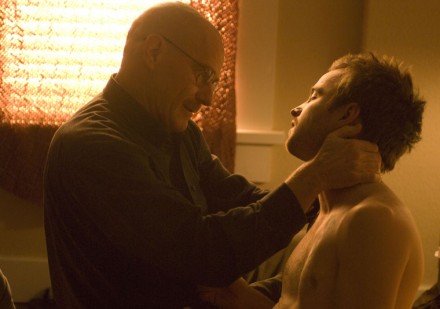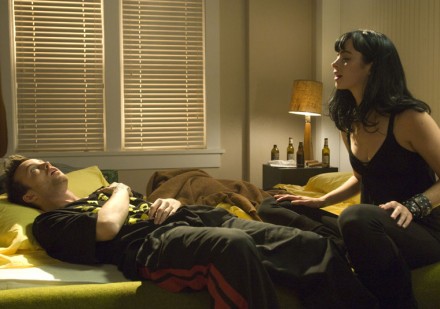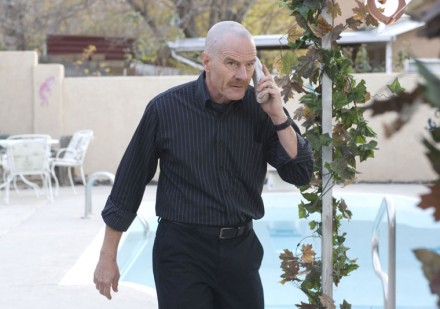TV Buzz: AMC's Breaking Bad Finally Crosses The Dark Side
Geez. Breaking Bad is breaking our innocent heart like the fourth grade. How about yours? With last Sunday's episode, "Mandala," the show tapped a pungent high too strong for /Film to ignore. Indeed, the latest ep in the best crystal meth drama outside of Wasilla, Alaska seemed to Ziploc the destinies of several main characters. Spoilers and tear drops ahead. If you're a fan, please chime in below. If you're not, what are you? A fan of Two and a Half Men? Do you know how much money that fat kid makes?!! Or, even worse, are you a fan of NBC's Mark (competing time slot)? Update: Discussion over the ominous body bags has started in the comments.
Jesse Pinkman would most certainly tack on a "Yo!!" to that question. Except, as seen in "Mandala"...Jesse Pinkman (Aaron Paul, amazing) is now a lost cause. He has truly become the loser that his well-to-do parents feared. A vacant spoonman. Thanks heroin. But really, a big, wet thanks should go out to his would-be girlfriend, the bad-news landlord with the shiny black hair, otherwise known as Jane. Sometimes known as Apology Girl. In a show that feeds on pun-y revelation, Apology Heroine would be too much. As played by the icily beautiful Kristen Ritter (Gossip Girl) Jane is revealed here to be an experienced spoongirl with addictions more chic and fatalistic than Jesse's. After so much Sopranos and Intervention, they are the tragic bedsitting couple that TV (and so many viewers) knows too well. We all saw this relationship coming to a head, right? Well, Jesse didn't. There are only seconds of hesitation before Jane is sinking a needle of meth and H into his veins. And then, in an exquisite bird's eye shot, Jesse is kissing the ceiling like a Danny Boyle Trainspotting baby at a FUBU store. His eyes say: "Yo, I'm gone. Leave a message if I know you."
The sand-line between Jesse and Walt, beyond their age difference, their perspective on the frailty and hunger for life, has never been more defined. With Walt grasping Jesse's stoned-head like a piece of empty fruit in this ep, the dissonance now appears to be marked permanently with laser-like precision. Walt is impossibly driven and angry against his sallow appearance; Jesse fulfilled with youth yet empty inside his fading rep as a gangster: a killer revealed to the streets to be harmless. He's alone. And not only does Walt not care that a member (which one? Walt doesn't care about his identity either) of his make-shift cartel was slayed point-blank, he no longer wants Jesse as a partner. He's barely asking questions at this point. If the looming competitors want to find him, they will kill Jesse first. In the meantime, he needs to become a professional.
"Mandala" was written to flip expectations on the head from the very start. It opens with a young boy pedaling down New Mexico streets on a bike. The kid appears to be an extra, or at most a sad if typical bystander in a fatal drug-dealer shoot-out. Minutes later, he is revealed to be a complicit murderer. But again, what is more shocking is that once the deed is done, Walt doesn't shed one tear or thought for his deceased "gang" member. It's a strange way for the show to confront the fact that Jesse's gang—a ridiculous rag-tag group of lowlives—is too cartoony for a show that thrives on realism and unpredictability. Jesse's outdated fashion preferences aside, he has always seemed too aware and too smart to hire such cardboard goons.

The homicide sets precedent for the entire episode, its central theme being the separation of "drug addict" and lightweight from the "serious drug dealer." As we see with the new character, Gus, discussed below: not only are well-executed looks deceiving, they are the bleak key to survival in this high stakes game. Walt's growing realization leaves Jesse stranded, leaving Jane to cradle him and whisper dreams. "I'll find you," she tells him as they shoot up. Meanwhile, Walt is hearing the opposite: "Never trust a drug addict." Walt is thirsty for this kind of 48 Laws of Power knowledge. Maybe it's arriving right in time: he's getting a little sloppy.
One aspect that I feel Gilligan has put off in the second season is Walt's relationship with his students and faculty. His students are surprisingly passive when his cell phone suddenly goes rattle rattle rattle on the ceiling of his classroom. Domestication interrupted. Even this no longer fazes him. Last season one rattle of transaction would have sent him to the restroom in shock, a heaving, pale mixture of cancer treatment and thriving anxiety. This was before snarky TV-lawyers paid visits to his classroom. Kids, like Jesse, are unschooled and clueless. They are now beneath his actions. Literally. But Walt's underestimation of youth may come to be his downfall.

Walt's closing thirst to become a millionaire, to gain real power—even as his cancer lies dormant—leads him to search out a so-called equal, Gus. He waits, and waits. He finally pleads, and the introduction happens. It is here that Walt really separates from Jesse, and Jesse from Walt. Over a million dollars is at stake. And as the owner of a chicken/breakfast chain, Gus has the perfect cover, seemingly, for an endless empire of meth. As pathologically played by actor, Giancarlo Esposito, Walt sees himself meeting Gus at the horizon. But there is brutal irony in that fact that Gus, this immaculately careful and manicured character, urges Walt to become as desperate and instinctive as he does by the final act of the ep.
Gus immediately lays out one major score for Walt to meet to solidify their symbiotic partnership. It's all or nothing. It is then, of course, that Walt's wife, Skyler, texts him to announce that their baby is on the way. [Lightning, Thunder, Hail] Walt seemingly chooses the money, the future, over his present, over a caring wife that is already tempted (again?) by another man due to his absence. It is here that Walt chooses a new life over the nurturing of his current one as a father, a husband. This is a first. This is a literal break in what has come before. It is not his family's future that Walt aspires to protect and secure, it is now his reputation as a drug dealer. His lone partner, a former student, is strung out in his bedroom. Walt makes a go for it alone.In "Mandala," Vince Gilligan, his amazing creative team, and Breaking Bad remarkably ask of us: do we follow a complete piece of shit to the promised land? This might be the first series where the audience no longer matters. Indeed, Gilligan has had the scorched teddy bear and body bag imagery from the presumed finale of season two laid out for a long time. Walt's destiny would appear sealed...possibly years before we met any of these characters. But last Sunday made it clear: Walt has encountered the dark side, it lures him because it's closely related to the abyss of death that he has come face-to-face with.As played with an increasingly mean edge by Bryan Cranston, death has shaped Walt like a scalding hot muscle. He will not stop. Hello, death. That is what he is truly up against, possibly what he secretly wishes for. As Walt's tunnel vision for the thrill of the drug world and its unknown power narrows, the fates of other characters in his life fade like weakness. Unlike The Sopranos nothing seems truly sacred to him. Blood and loyalty: Walt seems on the verge of tossing them out of the window at 80 mph like a cold cup of coffee. He is not only breaking bad, he is breaking all respect for life.Hunter Stephenson can be reached at h.attila[at]gmail.com and followed on Twitter.
